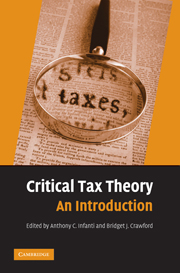Book contents
- Frontmatter
- Contents
- List of Illustrations
- List of Tables
- List of Contributors
- List of Common Abbreviations
- Introduction
- CHAPTER 1 FOUNDATIONS OF CRITICAL TAX THEORY
- CHAPTER 2 HISTORICAL PERSPECTIVES ON TAXATION
- CHAPTER 3 THE GOALS OF TAX POLICY
- CHAPTER 4 CRITICAL TAX THEORY MEETS PRACTICE
- CHAPTER 5 RACE AND TAXATION
- CHAPTER 6 GENDER AND TAXATION
- CHAPTER 7 SEXUAL ORIENTATION AND TAXATION
- Same-Sex Couples and the Federal Tax Laws
- The Internal Revenue Code as Sodomy Statute
- Heteronormativity and Federal Tax Policy
- Death Taxes: A Critique from the Margin
- Homo Sacer, Homosexual: Some Thoughts on Waging Tax Guerrilla Warfare
- CHAPTER 8 THE FAMILY AND TAXATION
- CHAPTER 9 CLASS AND TAXATION
- CHAPTER 10 DISABILITY AND TAXATION
- CHAPTER 11 GLOBAL CRITICAL PERSPECTIVES ON TAXATION
- CHAPTER 12 CRITICAL PERSPECTIVES ON CRITICAL TAX THEORY
- Index
Homo Sacer, Homosexual: Some Thoughts on Waging Tax Guerrilla Warfare
Published online by Cambridge University Press: 04 August 2010
- Frontmatter
- Contents
- List of Illustrations
- List of Tables
- List of Contributors
- List of Common Abbreviations
- Introduction
- CHAPTER 1 FOUNDATIONS OF CRITICAL TAX THEORY
- CHAPTER 2 HISTORICAL PERSPECTIVES ON TAXATION
- CHAPTER 3 THE GOALS OF TAX POLICY
- CHAPTER 4 CRITICAL TAX THEORY MEETS PRACTICE
- CHAPTER 5 RACE AND TAXATION
- CHAPTER 6 GENDER AND TAXATION
- CHAPTER 7 SEXUAL ORIENTATION AND TAXATION
- Same-Sex Couples and the Federal Tax Laws
- The Internal Revenue Code as Sodomy Statute
- Heteronormativity and Federal Tax Policy
- Death Taxes: A Critique from the Margin
- Homo Sacer, Homosexual: Some Thoughts on Waging Tax Guerrilla Warfare
- CHAPTER 8 THE FAMILY AND TAXATION
- CHAPTER 9 CLASS AND TAXATION
- CHAPTER 10 DISABILITY AND TAXATION
- CHAPTER 11 GLOBAL CRITICAL PERSPECTIVES ON TAXATION
- CHAPTER 12 CRITICAL PERSPECTIVES ON CRITICAL TAX THEORY
- Index
Summary
OF PARABLES AND PROVOCATEURS
Lesbians and gay men should be particularly interested in [Giorgio] Agamben's interpretation of Franz Kafka's parable Before the Law, which Kafka later incorporated into chapter nine of his book The Trial. It is worth reproducing this short parable in full before considering Agamben's interpretation of it:
[B]efore the Law stands a doorkeeper. To this doorkeeper there comes a man from the country who begs for admittance to the Law. But the doorkeeper says that he cannot admit the man at the moment. The man, on reflection, asks if he will be allowed, then, to enter later. “It is possible,” answers the doorkeeper, “but not at this moment.” Since the door leading into the Law stands open as usual and the doorkeeper steps to one side, the man bends down to peer through the entrance. When the doorkeeper sees that, he laughs and says: “If you are so strongly tempted, try to get in without my permission. But note that I am powerful. And I am only the lowest doorkeeper. From hall to hall, keepers stand at every door, one more powerful than the other. And the sight of the third man is already more than even I can stand.” These are difficulties which the man from the country has not expected to meet, the Law, he thinks, should be accessible to every man and at all times, but when he looks more closely at the doorkeeper in his furred robe, with his huge, pointed nose and long, thin, Tartar beard, he decides that he had better wait until he gets permission to enter. […]
- Type
- Chapter
- Information
- Critical Tax TheoryAn Introduction, pp. 215 - 220Publisher: Cambridge University PressPrint publication year: 2009



